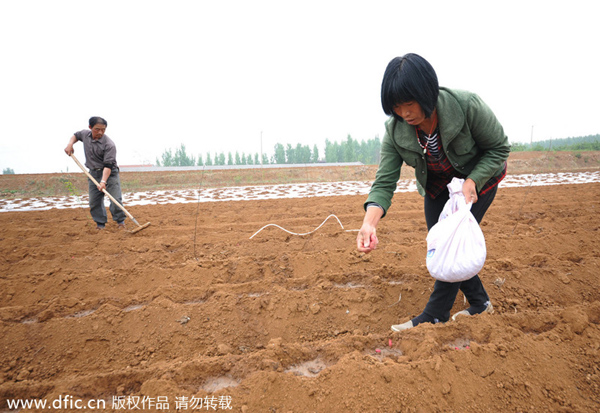Policies to protect villagers' interests overdue
(China Daily) Updated: 2015-12-28 08:52
 |
|
Villagers sow peanut seeds in Zaozhuang, East China's Shandong province on April 17, 2014. [Photo/IC] |
The annual central rural work conference, held on Thursday and Friday in Beijing, is reported to have discussed the issue of compensation for villagers when their arable land is requisitioned. Beijing News says it hopes that a new policy will protect farmers' rights and end the chaos caused by local officials and realty developers requisitioning arable land at low cost, says an editorial on Beijing News:
The requisitioning of arable land has caused a lot of conflicts, many of them bloody, in rural regions because local officials and realty developers tend to give very low compensation to farmers.
As early as 2011, the central authorities promised to make the compensation fair. For four years, the job was suspended because there was no specific policy about the issue from the top. Even though there were standards, farmers had no say since various levels of authorities decided the price unilaterally without ever consulting with villagers.
Actually, similar chaos used to be common in cities, too, when the authorities compensated residents very little for forcing them out of their homes. It was a national regulation published in 2011 that changed the situation by introducing legal standards. There are still disputes about house demolitions in cities, but at least they are not so bloody as they were in the late 2010s.
That's why the reported plan of arable land compensation is welcome news. It proposes regulating the behavior of government officials at various levels and preventing them and realty developers from requisitioning arable land without compensating farmers fairly. To the officials and developers such land means profits, but to the farmers the land is the livelihood for them and their families.
Of course, specific policies from the central authorities are far from enough. A lot of corresponding measures are needed, such as keeping enough money from the annual budget to compensate farmers, and allowing farmers to benefit from the profits made from developing arable land for commercial purposes.
That's the only way to protect farmers' rights, as well as ending the violence concerning land requisitions, which is common in domestic rural regions.
- Targeted measures for poverty alleviation uplift Nandan villagers
- Villagers make light of 'sacrifices'
- Rising food costs await villagers
- Land transfers thrive in rural China
- Rural land reform and SOE reform vex renowned economist
- More than 40% of China's arable land degraded
- Pressure mounts over arable land resources
- Arable land idle as farmers work in cities
- Protecting arable land
- Lawmakers concerned with use of arable land

Charlotte and Emilie Meaud, twin sisters, were killed at the terrace of the Carillon, during the attacks on Paris, on the 13th of November.










